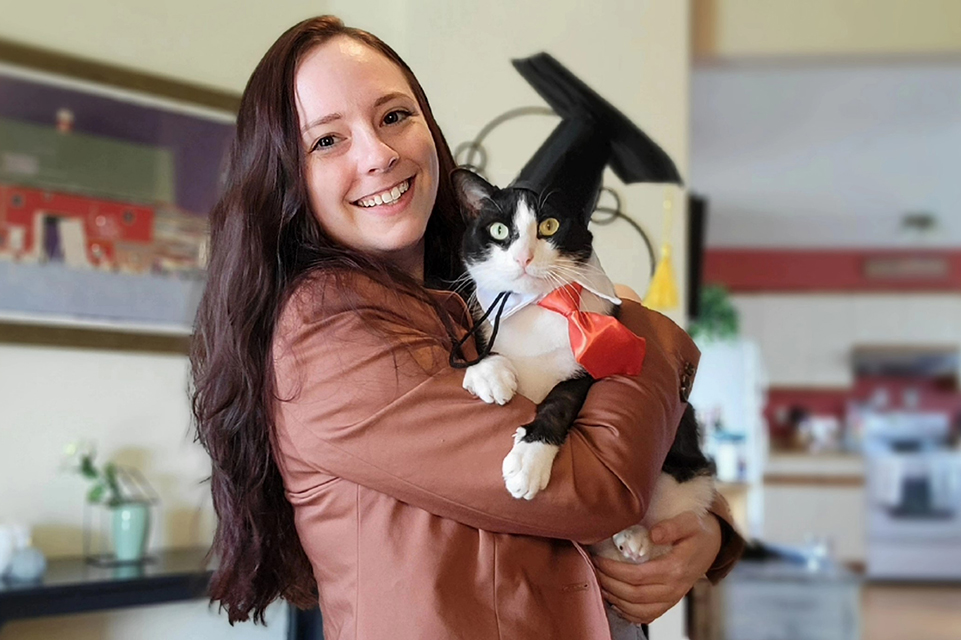My UMSOP Story: Allison Dunn, PharmD ’21, MS ’21, research assistant professor
Featured image: Allison Dunn holding her cat, Murphy, on graduation day.
Allison Dunn graduated in 2021 with dual degrees from the Doctor of Pharmacy (PharmD) and MS in Pharmacometrics (PHMX) programs. She works at the University of Maryland School of Pharmacy (UMSOP) as a research assistant professor in the Department of Practice, Sciences, and Health Outcomes Research (P-SHOR).
What are your responsibilities at UMSOP?
My primary responsibilities revolve around teaching and research. I teach two of the MS in Pharmacometrics courses, which include introduction to basic pharmacometrics tools and introduction to modeling. I also teach the PharmD pharmacokinetic course and an elective course on applied clinical pharmacology. My research varies, but all projects have a central theme of precision therapeutics.
What was your path to pharmacy school?
I realized as an undergraduate student that I wanted to pursue health care in some capacity, so I started working as a pharmacy technician to gain perspective. One of my required courses at the time was also an introduction to drug modeling. Needless to say, I really enjoyed both the course and my experience behind the counter. I started to think about how I could combine this analytical background with my interest in health and medicine. Pursuing the PharmD/MS in Pharmacometrics program at the School of Pharmacy seemed like the perfect marriage of the two fields.
What drew you to UMSOP?
UMSOP was one of the few schools that had everything I was looking for. There are only a handful of other pharmacy schools that even offer pharmacometrics training, let alone the opportunity to simultaneously earn a master’s degree. As a Maryland native, the financial benefit of staying in-state was also quite compelling. UMSOP was both my top choice and the only school I saw myself attending.
What led you to also complete an MS in Pharmacometrics? What was your experience like doing a dual degree?
My undergraduate studies were in bioengineering, so I had already built some of the foundation needed to pursue pharmacometrics. I was lucky enough to identify my intended career path, so I applied to UMSOP with the intention of pursuing the pharmacometrics dual degree. I cannot emphasize enough how much I enjoyed my experience. It both reinforced my interest in drug modeling and gave me an outlet to apply what I was learning in my didactic PharmD courses.
What has been your career path since UMSOP?
After graduating, I stayed at UMSOP to pursue a postdoctoral research fellowship with the Center for Translational Medicine (CTM). During this time, I continued my research, expanded my pharmacometric toolbox, and became a teaching assistant. I realized quickly that I was interested in staying in academia, and a year later I was fortunate enough to be brought on as a research assistant professor.
What motivates you to pursue this career?
I’m primarily motivated by the bigger picture of continuously improving patient care. There are so many questions that can be answered using pharmacometric methods. The career I pursued gives me the ability to focus my research interests on exactly this. One of my long-term career goals is to form more partnerships between CTM and our own University of Maryland, Baltimore affiliated clinics.
What kind of activities were you involved in as a student at UMSOP? What do you remember most about your time at UMSOP?
The plethora of available extracurriculars was something I was not expecting when I came to UMSOP. I was interested in health equity, so I joined the Student Section of Maryland Public Health Association and served as its president during my third year. I was also a member of the Phi Lambda Sigma Honor Society and served as secretary of the Rho Chi Honor Society. I also conducted research under the guidance of Joga Gobburu, PhD, MBA, professor of P-SHOR and director of CTM. I have a lot of special memories from my time at UMSOP, but one of my favorites was a wellness event I organized with another student where we brought therapy dogs to campus!
How have you used the knowledge or skills learned at UMSOP in your career? How has the dual degree helped your career?
The knowledge gained from the PharmD program allows me to bring real-world applications to the classroom. I believe it is easier to grasp pharmacometric concepts when you have that kind of context, so I’m thankful to get to share that background with my students. The dual degree has of course helped me when approaching new pharmacometric projects, but it has also just helped me with general task management. I would be lying if I said the workload wasn’t intensive, but tackling that challenge gave me the organizational tools I use today.
What is your advice to prospective students who might be considering applying to these programs?
My advice is to speak to former students about their experience. You’ll gain a better understanding of the type of career paths you can pursue and if your interests truly align with the program.
About the PharmD program: Based in downtown Baltimore, the PharmD at the University of Maryland School of Pharmacy combines basic and applied science as well as an in-depth therapeutics course of study to provide future generations of pharmacists with the knowledge and skills needed to be essential contributors in the dynamic health care arena. Learn more and apply today.
About the MS in Pharmacometrics program: The objective of the MS in Pharmacometrics is to allow current professionals to acquire skills and knowledge to plan, perform and interpret pharmacometric analyses with the goal of influencing key drug development, regulatory and therapeutic decisions. Learn more and apply today.

